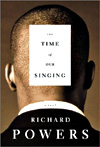
Comment
on this story
|
 |

Richard Powers digs into race, music and U.S. history
by Jonathan B. Frey
"Inside each of us is a script of the greater epic writ little, an atlas of politics so abundant it threatens to fill us full to breaking." Taken from Prisoner's Dilemma, Richard Powers' second novel, this line could describe any one of his fictions, all drafts in miniature of the human condition, all as a consequence at risk of losing their center.
Powers' first novel, Three Farmers on Their Way to a Dance, spiraled from a Detroit museum encounter with a 1914 photograph to attempt encapsulation of World War I. Goldbug Variations began with a librarian composing a "This Day in History" note thence to unravel the genome. Galatea 2.2 circumscribed artificial intelligence, Gain the consequences of American industrial ingenuity, Plowing the Dark the limits of human imagination. These and other Powers novels situate characters into a greater human drama, endeavoring to extrapolate individual particularity, to map the intensely personal to the universal.
Powers' latest, The Time of Our Singing (Farrar, Straus, Giroux, $27), also shares these qualities. Ostensibly the story of two brothers, Time is told in the first person by the younger of the two, beginning at a 1961 vocal competition in Durham, NC, with Joseph (the narrator) at the piano and elder brother Jonah singing, their father and younger sister in the audience. It traces the brothers' musical upbringing in New York City— home-schooled prodigies, attendance at a Boston music academy, followed by Julliard, an early joint recital career, and then separate  occupations as teacher in Oakland and world famous tenor in Europe. Interleaved into this narrative is the story of their parents—their first encounter in 1939, her early death in a fire, his subsequent estrangement from his children—as well as a quasi-history of the Western vocal tradition, with the occasional pop and jazz sidebar. occupations as teacher in Oakland and world famous tenor in Europe. Interleaved into this narrative is the story of their parents—their first encounter in 1939, her early death in a fire, his subsequent estrangement from his children—as well as a quasi-history of the Western vocal tradition, with the occasional pop and jazz sidebar.
These particulars give way to a question posed to Jonah and Joseph following their Durham success: "What exactly are you boys?" And there's the rub. For if Time of Our Singing is ostensibly about two brothers and music, it is explicitly about race. As it happens, Jonah, Joseph, and sister Ruth are born of David Strom (German émigré, white, Jew, physicist) and Delia née Daley (American, black, Baptist, nurse), whose lives fatefully collide at an historic Easter Sunday recital: black contralto Marian Anderson's 1939 performance for 75,000 on Washington Mall, result of a race-motivated barring of her from Constitution Hall by the Daughters of the Revolution (thereby establishing a Mall milestone to prefigure others). The catalyst in Delia and David's acquaintance, a lost child whose family they jointly locate in the Mall crowd, foretells their undoing, inquiring into their togetherness moments after its commencement: "How come you two together? Don't you know about black and white.... The bird and the fish can fall in love. But where they gonna build their nest?"
These questions ostinato the Stroms' divided response to a public not yet ready for the future they represent, the logic-defying calculus of race in America, caught between hypodescent's rock (that half-castes acquire the status of the lower), and the hard place that is accusations of white culture flunkeyism. "Maybe it could work after all, this act of total madness. Maybe they could make an America more American than the one the country has for centuries lied to itself about being." Or not. One American's framer is another's enslaver, a relationship too intimate to ignore, yet from which Powers seeks optimism.
As is his custom, Powers' language hazards contrivance, at turns fascinatingly tangled ("Charter citizens of the postrace place, both races, no races, race itself: blending unblended, like notes stacked up in a chord"), strident ("David and her father trading accusations: an Olympics of suffering. The moral leverage of pain. The two men couldn't hear their nearness"), and transcendent ("The crushing innocence of his old high notes, the ones that made listeners want to take their own lives in shame, gave way to the richer highlights of adult awakening"). Similarly, incorporating the timeline of U.S. race relations into the narrative can reveal narrative prose machinery, the controlling hand of the designer glimpsed. So too Powers' masterful capture of family dynamics, the simultaneously sensitive and brutal intimacies only families permit, will on occasion creak.
Suchlike aside, Time of Our Singing is a breathtaking high-wire act of theme, plot and language choreographed to ensure we understand the Stroms as ourselves and the consequences of history perhaps better than we want to admit.

September 18, 2003 * Vol. 13, No. 38
© 2003 Metro Pulse
|